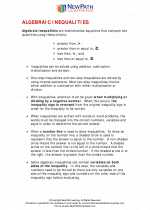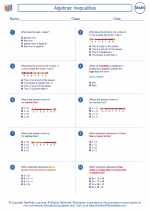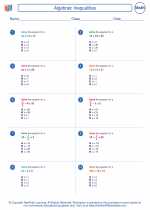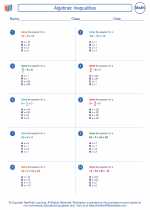Rational Functions
A rational function is a function that can be expressed as the quotient of two polynomial functions. The general form of a rational function is:
f(x) = P(x) / Q(x)
Where P(x) and Q(x) are polynomial functions and Q(x) is not equal to zero. The domain of a rational function is all real numbers except the values of x that make the denominator Q(x) equal to zero.
Key Concepts:
- Numerator and Denominator: The numerator is the polynomial function in the numerator of the rational function, and the denominator is the polynomial function in the denominator of the rational function.
- Vertical Asymptotes: Vertical asymptotes occur at the values of x that make the denominator equal to zero. If Q(x) has a factor of (x - a), then x = a is a vertical asymptote.
- Horizontal Asymptotes: Horizontal asymptotes occur as x approaches positive or negative infinity. To find horizontal asymptotes, compare the degrees of the numerator and denominator. If the degree of the numerator is less than the degree of the denominator, the horizontal asymptote is y = 0. If the degrees are equal, the horizontal asymptote is the ratio of the leading coefficients.
- Oblique (Slant) Asymptotes: Oblique asymptotes occur when the degree of the numerator is exactly one more than the degree of the denominator. To find the oblique asymptote, perform polynomial long division and the oblique asymptote is the quotient.
- Graphing Rational Functions: To graph a rational function, determine the vertical asymptotes, horizontal asymptotes, and any intercepts. Then plot points to sketch the graph, paying attention to the behavior around the asymptotes.
Study Guide:
When studying rational functions, make sure to focus on the following key aspects:
- Understand the definition of a rational function and the domain restrictions.
- Be able to identify the numerator and denominator of a given rational function.
- Practice finding vertical, horizontal, and oblique asymptotes for different rational functions.
- Learn how to graph rational functions by identifying key points, asymptotes, and behavior around the asymptotes.
- Master the skill of simplifying and analyzing rational functions to understand their overall behavior.
By mastering these concepts, you will gain a strong understanding of rational functions and be able to solve problems related to these functions with confidence.
Good luck with your studies!
.◂Math Worksheets and Study Guides Seventh Grade. Algebraic Inequalities
Study Guide Algebraic Inequalities
Algebraic Inequalities  Worksheet/Answer key
Worksheet/Answer key Algebraic Inequalities
Algebraic Inequalities  Worksheet/Answer key
Worksheet/Answer key Algebraic Inequalities
Algebraic Inequalities  Worksheet/Answer key
Worksheet/Answer key Algebraic Inequalities
Algebraic Inequalities 

 Worksheet/Answer key
Worksheet/Answer key
 Worksheet/Answer key
Worksheet/Answer key
 Worksheet/Answer key
Worksheet/Answer key

The resources above cover the following skills:
Algebra (NCTM)
Represent and analyze mathematical situations and structures using algebraic symbols.
Use symbolic algebra to represent situations and to solve problems, especially those that involve linear relationships.